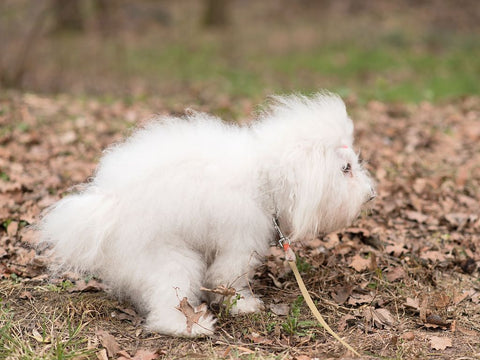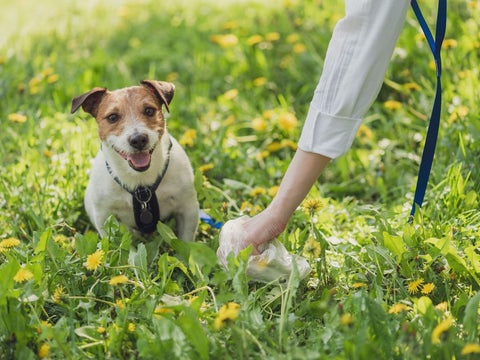Why Do Dogs Eat Poop? Understanding Coprophagia
One of the most baffling and unpleasant habits that dogs can exhibit is coprophagia, which is the scientific term for the consumption of feces. While it may seem repulsive to us, this behavior is not uncommon in dogs.
In this article, we will explore the reasons behind why dogs eat poop and what you can do to manage or prevent this behavior.
My Dog Is Eating Poop! What Should I Do?
The Dirty Truth About Why Dogs Eat Poop
Instinctual Behavior
One possible reason for coprophagia in dogs is rooted in their evolutionary history. In the wild, canines are scavengers and opportunistic feeders. They might eat feces to obtain nutrients, especially if they are lacking in their diet. This behavior is a survival instinct that dates back to when their ancestors needed to make the most of available food sources.
Nutrient Deficiency
Sometimes, dogs eat feces because they are not getting the essential nutrients they need from their regular diet. If their food doesn't provide all the necessary vitamins and minerals, they may seek out feces as a source of these missing nutrients.
Attraction to Smells
Dogs have an incredibly acute sense of smell, and they are naturally curious creatures. If they come across feces, especially from other animals or even their own, they may be drawn to the smell out of curiosity. It's important to remember that dogs perceive smells differently than humans, so what is repulsive to us might not be the same for them.
Mimicking Mother's Behavior
Puppies often learn behaviors by observing their mothers. If a mother dog cleans up her puppies' feces by eating it, her puppies may imitate this behavior. In a domestic setting, puppies may carry this habit into adulthood.
Attention-Seeking Behavior
Some dogs may eat feces as a way to get attention from their owners. They may have discovered that engaging in this behavior elicits a reaction, even if it's a negative one.
Stress or Anxiety
Stress and anxiety can lead to unusual behaviors in dogs, including coprophagia. If a dog is feeling anxious or distressed, they may eat feces as a coping mechanism.
Medical Issues
Sometimes, medical problems can lead to coprophagia. Gastrointestinal issues, malabsorption problems, or parasites can affect a dog's digestive system, making them more likely to eat feces.

All Ways to Prevent Your Dog From Eating Poop
Behavioral Training
Positive reinforcement training: Use rewards and praise to encourage good behavior. When your dog refrains from eating feces, reward them with treats, playtime, or affection.
"Leave it" command: Teach your dog a reliable "leave it" command to prevent them from approaching or consuming feces. Consistent training can help control the behavior.
Dietary Supplements
Some dietary supplements may help deter coprophagia. For example, adding pineapple or meat tenderizer to your dog's food may make their feces less appealing.
Restrict Access
If your dog is consuming feces from other animals, such as in the backyard or on walks, try to restrict access to those areas. Keep your dog on a leash or supervise them closely during outdoor activities.
Use Repellents
Commercial products are available that can be applied to feces to make them taste bad. When your dog encounters these treated stools, it can deter them from eating feces. Always consult with your veterinarian before using any products to ensure they are safe for your dog.
Multiple Dog Households
In households with multiple dogs, it's important to ensure that each dog is receiving the proper amount of attention and nutrition. Coprophagia can sometimes occur when one dog feels neglected or stressed.
Consistency
Be consistent in your approach to managing coprophagia. Inconsistent responses to the behavior can confuse your dog.
Monitor Your Dog's Habits
Pay close attention to when and where your dog engages in coprophagia. Understanding the patterns can help you implement strategies to prevent it.
Regular Exercise
Adequate exercise can help reduce stress and anxiety, which are sometimes triggers for coprophagia. Ensure your dog gets enough physical and mental stimulation through play and exercise.
Behavioral Modification Techniques
Consult with a professional dog trainer or behaviorist who can provide customized strategies to address coprophagia. They can help you develop a plan that is specific to your dog's needs and temperament.
Keep Litter Boxes Clean
If you have both dogs and cats in your household, keep the cat's litter box clean and out of reach for your dog to prevent them from accessing cat feces.
Environmental Enrichment
Provide your dog with toys and activities to keep them mentally stimulated. Boredom can lead to undesirable behaviors like coprophagia.
Medications
In some cases, your veterinarian might recommend medications to address underlying behavioral issues or anxiety that contribute to coprophagia.
Muzzle Training
Muzzle training can be useful as a temporary measure to prevent your dog from consuming feces during walks or in areas where you can't control their access.
Seek Support
Coprophagia can be frustrating for pet owners. Don't hesitate to seek support from online forums, local dog clubs, or support groups. Others who have experienced similar issues can provide valuable advice and emotional support.
Be Patient
Remember that changing your dog's behavior takes time and patience. Be persistent and stay committed to addressing the issue with kindness and consistency.
Keep Your Dog Hydrated
Make sure your dog has access to clean, fresh water at all times. Sometimes, increased water intake can help deter coprophagia.
Clean Up Promptly
If your dog has an accident in the house, clean it up promptly and thoroughly. Leftover smells can attract your dog back to the area.
Seek Professional Help
If your dog's coprophagia is severe, persistent, or associated with other behavioral issues, it's a good idea to consult a professional dog trainer or animal behaviorist for specialized guidance.

Coprophagia can be a challenging issue to address, but with persistence and the right approach, many dogs can overcome this behavior. It's important to remember that not all dogs engage in coprophagia, and for those that do, there can be a variety of contributing factors. Consultation with a veterinarian or professional dog trainer can help you develop a personalized plan to manage or eliminate coprophagia in your dog.
